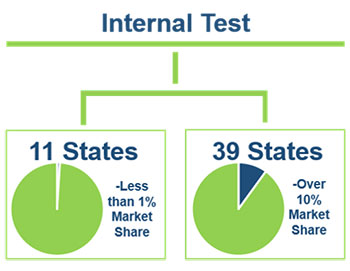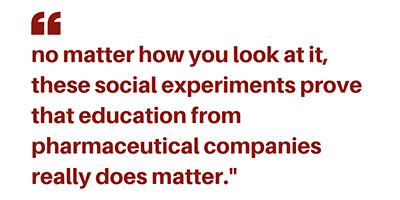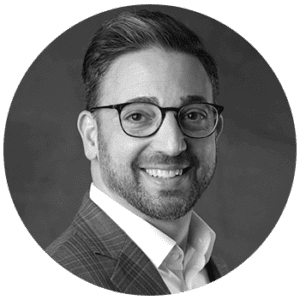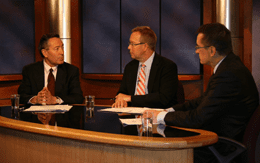In the last 25 years, two events have changed the face of how we educate doctors. The first occurred in 1992 when Merck introduced a revolutionary new product for benign prostatic hyperplasia (BPH)—PROSCAR (finasteride). It was hailed as so revolutionary that Merck’s CEO, P. Roy Vagelos, MD, hypothesized that doctors weren’t influenced by marketing and sales force promotion. To prove this he put a stake in the ground and conducted an internal test. In 11 states, one of which I was a sales rep at the time, there was to be no direct sales promotion to urologists or any other healthcare professionals (HCPs). Merck’s marketing department instead sent samples and untraditional sales kits directly to HCPs in the mail, but no peer-to-peer (P2P) education or sales force promotion. In the other 39 states, it was business as usual with regular selling and speaker programs.
 After a 6-month evaluation, Merck looked at the results and halted the study. They learned that while the states that continued with regular speaker programs had an 11% market share, the 11 states with no promotion had less than a 1% share. Just like in life, it was a spectacular lesson due to a miserable failure. Urologists were calling Merck, complaining about receiving no personal communication and some even boycotted the product. It was a public relations disaster which eventually affected the patients who weren’t given the option of this BPH therapy and instead had surgery. A powerful lesson for Merck—and pharma.
After a 6-month evaluation, Merck looked at the results and halted the study. They learned that while the states that continued with regular speaker programs had an 11% market share, the 11 states with no promotion had less than a 1% share. Just like in life, it was a spectacular lesson due to a miserable failure. Urologists were calling Merck, complaining about receiving no personal communication and some even boycotted the product. It was a public relations disaster which eventually affected the patients who weren’t given the option of this BPH therapy and instead had surgery. A powerful lesson for Merck—and pharma.
In the years that followed, pharma industry sales reps mushroomed from a total of 15,000 to 120,000. For the first time, every pharmaceutical company received validation that sales force promotion and education matters, and they took action. Pfizer tripled their sales organization; Merck doubled theirs and the industry overall became so large that HCPs often saw it as a nuisance. Physician offices limited access and hospital systems limited spending.
The industry hit the point of diminishing returns and US pharmaceutical companies have shrunk to about 70,000 representatives1. It took the next 15 years to begin understanding the science behind quality over quantity in selling and education. It’s about educating doctors which leads to meaningful improvements in patient care.
The second illustration of the value of P2P marketing happened more recently regarding paying speakers for speaker programs and I believe is the catalyst for an increased demand in P2P marketing. While marketing departments are well known for sales force strategies that are well-intentioned along with direct-to-consumer campaigns which turn disease into dancing, the real jewel of pharmaceutical marketing is P2P. In late 2013, GlaxoSmithKline (GSK) publicly announced that they vowed to no longer pay external speakers to speak on behalf of their products. In January 2014, I published an article on the topic where my opinions differed, stating:
“KOLs and other physicians who act as contracted agents for pharma, have been chosen because they are reputable and are known by their peers to do what’s right. There are always those rare professionals who have problems with ethics and integrity; in this industry, those individuals need to be removed from speakers bureaus. Plain and simple. Speaker programs provide a fantastic forum for peer-to-peer discussions. In the end, the goal is to improve patient care by providing better pharmaceutical insight through the physicians who care for patients.”2
 Recently, GSK announced that after 6 years, they will once again pay external speakers to educate physicians on their products. Smarter, more learned with a renewed commitment to HCP Education, starting anew—GSK is back in the game.
Recently, GSK announced that after 6 years, they will once again pay external speakers to educate physicians on their products. Smarter, more learned with a renewed commitment to HCP Education, starting anew—GSK is back in the game.
Admitting that it was an experiment gone wrong, Evan Berland, GSK, Director, US Corporate Communications and US Head, US Digital stated, “An industry shift to the standards we announced in 2013 has not materialized. HCP feedback has shown they prefer to learn about new data through peer-to-peer programs with global expert practitioners who have direct experience with our medicines.”
GSK’s experiment took longer than Merck’s, but no matter how you look at it, these social experiments prove that education from pharmaceutical companies really does matter. Many doctors do listen to their sales reps. Moreover, they really listen to their peers who are often academics, clinical trialists, and patient advocates.
I stand by my opinion from 2014 that most HCPs are in this business because they want to improve the lives of others. I’ve believed this since I was a child when I watched my father take care of patient needs while working in his pharmacy. Physicians aren’t motivated by giving a talk for a payment equal to what they’d receive for seeing a patient. Better guardrails are in place today than ever before thanks to guidance from the Office of the Inspector General (OIG), which confirms PhRMA’s commitment to integrity, with a thorough compliance program built into every major pharmaceutical company I step into as a supplier.
The pharma industry is great. Its employees care. The speakers who deliver education on disease states and their corresponding therapeutic options have integrity. Now let’s sit back and watch the next wave of growth in pharma marketing.
References
1. Pharmaceutical Commerce, Sales rep count holds relatively steady at 70,000, says ZS, https://pharmaceuticalcommerce.com/brand-marketing-communications/sales-rep-count-holds-relatively-steady-70000-says-zs/. November 13, 2017
2. Rehal D. Can Your Brand Survive Without Paying Speakers?. https://vision2voice.com/Blog/post/29. January 15, 2014.





